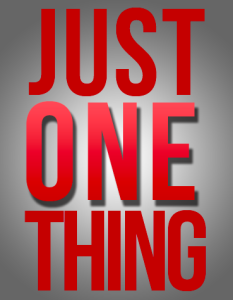 The “Just One Thing” Series at Management Excellence is intended to provoke ideas and actions around topics relevant to our success and professional growth. Use them in good health and great performance!
The “Just One Thing” Series at Management Excellence is intended to provoke ideas and actions around topics relevant to our success and professional growth. Use them in good health and great performance!
—
If your typical day resembles the one that most of us experience in the corporate environment, it’s a series of meetings interspersed with a series of transactional exchanges that might be better described as interruptions.
There’s little of that elusive and precious asset called “quality time” on our calendars or in our days. The steady drumbeat of deadlines is constantly playing in our minds and at times, it feels like there’s a fire to fight around every corner. When we’re given the opportunity to be creative, it’s often in forced marches through meetings with the labels of “planning” or “brainstorming.”
Our days are filled with what has been described as “unproductive busyness.” We sprint from meeting to meeting letting the Outlook calendar drive our days. And even when we’re supposed to be focusing, too many of us are obsessively checking our devices searching for something to stimulate our brains. After all, there must be something more important than this meeting going on in front of us.
Since when did meetings become excuses to catch up on email?
Chris Lowney, a former Jesuit priest turned Investment Banker (an interesting career path to say the least), writing in his book, “Pope Francis: Why He Leads the Way He Leads,” describes what happens when we don’t create the time for daily reflection: “And so we turn ourselves into hamsters on hamster wheels: spinning, but not necessarily moving forward.”
I see the long-term impact of no down-time…no thinking time in the form of worn-out mid-career managers and exhausted senior leaders who struggle through their days. They’ll describe in private that they no longer feel the same passion for the work they once loved, and they worry that they’ve lost their edge and will be unable to get it back. They are worried and frightened of what this state portends for the balance of their careers.
What we fail to do in our workdays is find time to think deeply. From unstructured conversations to reflective time on our own roles and our performance in the workplace, the time spent thinking and talking without a deadline is valuable processing time.
This isn’t down time, it’s different time. Instead of unproductive busyness, it’s productive un-busyness. It’s the root source of ideas and connections between ideas. It’s the time when we see our way forward through complex problems and toward solutions that have been otherwise elusive.
Productive un-busyness cannot be mandated, but it can be prioritized. The most successful leaders and managers I know have cultivated a mechanism that helps them recharge by creating thinking time and/or pushing themselves so far from the activities of work that the brain gets a momentary and much appreciated holiday. Lowney offers the Jesuit practice of Examen: a daily technique of prayerful reflection, as one approach for leaders and professionals struggling to jump off the hamster wheel.
From meditation and prayer to the lunchtime walk-about or workout to quiet reading time, it doesn’t matter what you do as long as you make the time to shift gears and let your brain focus somewhere other than e-mail or the noise coming from yet another status meeting.
Every day.
The Bottom-Line for Now:
No program, no management fad, no short-list of the top ten things to do. Just a reminder that your brain and the brains of your team members will serve you best if you build in and/or encourage people to regularly tune out the drumbeat and turn off the updates. I’ve watched burned-out managers come back from the brink by recognizing the need to create time to think deeply, and then making it a habit. Whether it’s for your professional mental health or for the health of your team members, it’s important to find ways to momentarily reflect and place things in context.
—
Don’t miss the next Leadership Caffeine-Newsletter! Register here
For more ideas on professional development-one sound bite at a time, check out: Leadership Caffeine-Ideas to Energize Your Professional Development.
New to leading or responsible for first time leaders on your team? Subscribe to Art’s New Leader’s e-News.
An ideal book for anyone starting out in leadership: Practical Lessons in Leadership by Art Petty and Rich Petro.
